

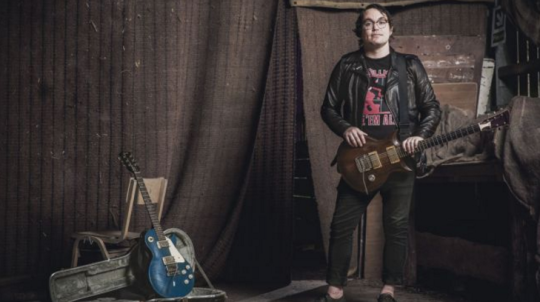
Are Deafheaven the genre-bending antidote to heavy metal’s conservatism? We meet their chief songwriter and guitarist Kerry McCoy to talk black metal, Johnny Marr and why their critics have got them wrong.
What is metal? Or more precisely, who is metal? Of all the genres, metal fans seem the most fractious in our digital age; many duking it out in wars of words online as they seek to question the credentials of emerging talent. Korn, Trivium and Bring Me The Horizon are just a few who have gone the through the same hazing process; their heavy/authentic credentials doubted by metal traditionalists.
One such band, is San Francisco’s Deafheaven, “It’s a weird thing, because I understand that we’re not for everyone,” reasons guitarist Kerry McCoy with a calm sincerity. “The type of person that wants to listen to Blasphemy, Bathory and Venom… we’re not going to be for them, and that’s fine. The thing that I don’t like is when people seem to want to enforce these rules. For me that’s boring.”
Kerry’s band aren’t just getting people talking by rattling their cages. Metal debate aside, Deafheaven’s records are genuinely exciting propositions that draw fans from all genres; a swirling, progressive pot of extremes with blast beats, co-founder George Clarke’s impassioned screams, and Kerry’s blend of intense metal picking, otherworldly shoegaze, dreamy alternative rock… even Oasis influences. And they’ve had a horde of supporters and critics desperate to pin a tag on them as a result; everything from blackgaze to hipster metal.
Latest album, New Bermuda, is further proof this is far from a flash in the pan scenario. And while Kerry is the first to admit his band aren’t the first to combine some of their disparate influences, his band are certainly making uniquely powerful musical statements with them. Kerry’s open-minded approach to tone and composition is a huge part of that. But firstly, let’s pick things up again with him about this whole ‘metal’ brouhaha…
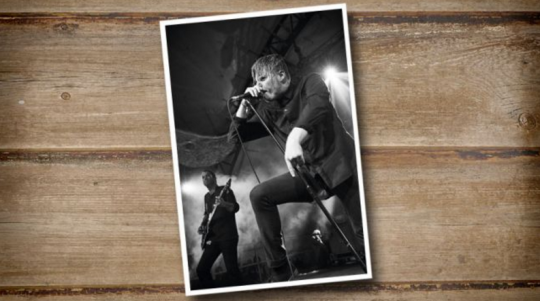
There seems to be a lot of discussion online about what Deafheaven are…
“It’s the reason we don’t call ourselves a black metal band, because we’re not. We’re influenced by it, but we don’t have the ethos, the aesthetic or really the sound of one at this point, because there are way too many other influences in our sound. And that’s not just from the post-rock thing either, we have influences from alternative rock, Slayer and early Metallica.
“The thing that I’ve found in playing festivals and meeting people is a lot of the stuff with people having a very conservative view of metal, most of that comes from fans and people outside of it, not from the people in these metal bands. We met the dudes from Pig Destroyer the other week, and they were telling us that they and Cattle Decapitation love our record. And they are grind bands.
“Or when we toured with Justin Broderick from Godflesh; the people who make music and love metal, they get what we’re doing and that we’re not trying to personally offend anyone or bastardise the genre. I find that the people commenting, they’re the ones that have the issue because they have more to prove; it’s their identity. The guys in the bands are usually into whatever is interesting to them.”
There was a hugely positive response to your previous record, Sunbather - did you have a clear idea of where you wanted to head next with this record?
“Yes, and the thing with this record, because of the big splash Sunbather made, is that it was a constant battle of not getting too caught up in my head about it. But a big goal on this record for me, and the band as a whole, was to consciously move away from the shoegaze and post-black metal thing. They’re great genres but the whole crescendo and reverb/delay thing has been kind of done to death.
“While there’s still elements of that on the record, it was a conscious decision to trim the fat and make it riffier. Be a lot heavier and when we have the clean parts, make them more Smashing Pumpkins or Wilcoesque; where’s there’s riffs and hooks instead of being super spacey.”
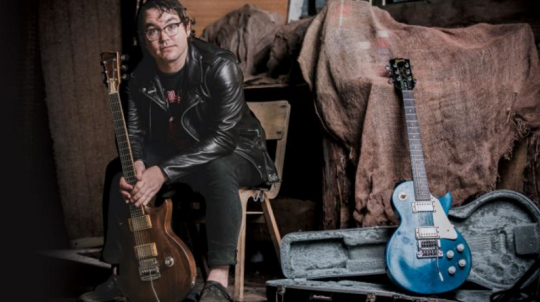
Did playing punk when you first started out on guitar have an impact on your style now?
“I grew up on the outskirts of the Bay Area and at that time it was a lot of the late 90s/ early 2000s Gilman scene; AFI, Nerve Agents… all that type of stuff. I was really into that stuff and being into that before I got into metal, it influenced the sense of melody and high energy.
“The harmonised elements - they use a lot of octaves, a lot of dramatic chord progressions and have a way of doing that build and release thing. Anyone who likes our band will notice pretty much everything has a blast beat in it [somewhere], because I like really catchy high-energy fast parts; that’s a big thing for me.”
When did British guitar influences such as Kevin Shields and Johnny Marr come in?
“When I was 16. We used to drive from California to Colorado every summer for two weeks to visit my grandparents and uncle Kevin, who was kind of the hippy of the family. He saw I had a Cure shirt and was getting into punk when I was about 15, 16. He burned me The Smiths’ Louder Than Bombs and I was so stoked, I loved it.
“I’ve loved The Smiths since then. And when George was 16 I got him The Smiths greatest hits for his birthday. And I remember him telling me, and this is true of a lot of people with The Smiths and Morrissey, he didn’t get it at first. Then he slowly got how great that stuff is. But in terms of British music; The Smiths, Oasis, The Cure, Happy Mondays, Stone Roses… all that stuff is great to me.”
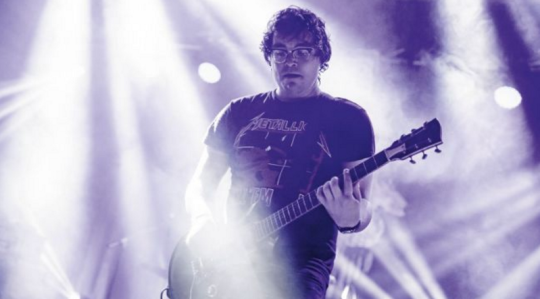
Was the fusing of metal and alternative music together a conscious idea?
“Yes it was. But this is another thing we always get hate for on the internet, all these people talking about how other people have done this, and we’re stealing this blah, blah, blah.
“That’s the thing, the moment when I realised we could have shoegaze- and post-rock-influenced stuff with black metal was when I heard other bands doing it. I heard Lantlôs from Germany, ColdWorld and then Alcest and all the French bands.
“I remember Fell Voices and the early Ash Borer stuff, and it being an interesting thing to me. Because I was in post-rock bands when I was in high school and I’ve always been interested in melody. I would write music like that, as well as metal. So to me it was just kind of a natural thing.
“Our old band broke up and we had nothing to do so the idea was a band that was all the kinds of music that I really like, but I’ll try to put it together as seamlessly as possible. Our whole thing was to never be afraid to do something; if it feels like it works to us then we won’t concentrate on what’s ‘not allowed’.
“If I want to write a riff that has a blast beat behind it but it has a major chord, we’ll do that if it works. There was never one moment when I thought, ‘we can do this’, but there was a gradual realisation. There’s no reason why I can’t put this Cranberries part after this blast beat.”
One thing that you seem to be refining on New Bermuda is transitioning, often between minor and major, without feeling jarring. Did it come from experimentation?
“With me, there’s two things I love about good songwriting. Obviously, there’s a good chord progression or a lead that just fits perfectly and gives you the peanut butter and chocolate moment. Then there’s the transitions. I love it when bands have great riffs, but if all you’re doing is riff-stacking - when there will be a great riff that will ring out, and then the other riff will start…
“I prefer it when bands can build something, and seamlessly go from one thing to another. It’s something I’ve worked hard on for a long time - the transitions and bridges between riffs, building tension and creating movement instead of just stacking riffs.”
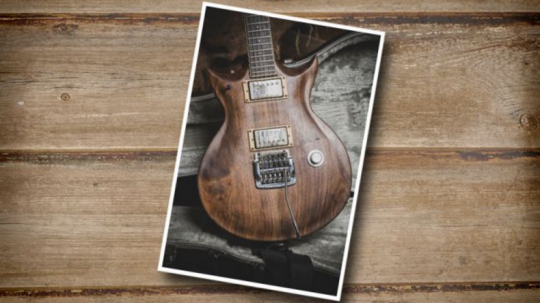
Baby Blue sounds like a key song for the band on this record, in the way it seems to combine a number of your influences…
“For me that was a weird thing because a lot of that happened in the practice space instead of happening at home. I’ve had that three-chord progression at the beginning since Sunbather and just hadn’t used them, and they weren’t in that arpeggiated pattern. They were going to be an interlude on Sunbather but I didn’t use them. So I took that and added a phaser to it.
“My idea was that if you could take Johnny Marr and put him in Rush for a second, that was my idea for that intro. Then that part before it kicks in, for me that’s Russian Circles, and I love that band. When it does kick in, that’s essentially my ode to this old Bay Area screamo band called Funeral Diner. And we just wanted to do this big heavy mid-tempo thing, dirge-y yet melodic. Then the end is a total homage to Slayer.
“So I guess it’s a key track but we love all the songs on this record. We’ve always just done what we want to do, if it works we’ll do it. Not to say we’re super crazy for that but it was wanting to combine all those influences on one song.”
There’s also some Metallica in that melodic wah solo too?
“That’s just a part of this record of trying to incorporate classic era Hammett, like Ride The Lightning. Obviously I’m not as fast or technically able as that guy. But the whole record has that, there’s Hetfield-style riffing, or my take on it. I don’t think I went too overboard with the solos but when I want to put one in, for me it’s usually Hammett and Mustaine’s [contributions] to Kill ’Em All, that’s what I’ve been really into recently.”
Do you think there is common ground between post-rock and black metal guitar?
“Absolutely. Because of the way the band started with myself, a lot of the way I write is taking a rhythm riff and then trying to see if I can play some kind of lead at the same time as playing a rhythm. Which is why a lot of the chords are kind of weird.
“I’ve always been of the opinion that the only thing that separates genres with riffs is what you do with them. If you take a Cranberries riff and you put it through a Burzum production, at that tempo and stretch the riff out, you can totally write a black metal song with that riff. It’s an E minor riff that’s simple, sad and atmospheric.
“To me it’s simple, I don’t understand why more people don’t get that. You can take an At The Gates riff, delay it and put a bunch of reverb on it and make it into a very dark post-rock song. You can do the same with a post-rock song and turn it into thrash metal or whatever. That’s the key to our band; riffs are riffs, but the context you put them in determines the genre.”
by Rob Laing (Total Guitar)